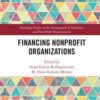
Beeld oratie: The Societal Significance of Charity Lotteries
Using multiple quantitative and qualitative methods, this research project investigates the societal impact of charity lotteries. The overarching research question is: What are the effects of unrestricted (core) and long term funding practices by grant making foundations, and in particular the Dutch Charity Lotteries, on the work of grantee organizations?
Lees meer
Crowding-out or crowding-in: The dynamics of different revenue streams
An important question in public economics is to what extent changes in government funding lead to changes in private donations. In this chapter we identify and summarize four theoretical perspectives answering this question: the micro-economic, institutional-political, institutional signaling, and organizational perspective. Reviewing the empirical support for each perspective, we find that none of the perspectives…
Lees meer
From research to practice: implementing academic research on donor motivation to help fundraisers improve relationships with donors
How can fundraisers build stronger relationships with their donors? We argue that by better understanding why a donor chooses to make a donation, and why a donor donates to a specific charity, the quality of the relationship between donors and charities could be greatly improved. A current trend in marketing is hyper-personalisation: creating a personalized…
Lees meer
Jubileumspecial: Twintig jaar Geven in Nederland
Hoe is de filantropie in Nederland in de afgelopen twintig jaar veranderd? Hoe kunnen we de veranderingen in het geefgedrag verklaren? In welke groepen doen deze trends zich het sterkst voor? En welke groepen maken de filantropie veerkrachtig? Prof. dr. René Bekkers, Prof. dr. Pamala Wiepking en Dr. Arjen de Wit beantwoorden deze vragen in…
Lees meer
Giving in the Netherlands: A Strong Welfare State with a Vibrant Nonprofit Sector
The Netherlands has a rich philanthropic history, dating back to the late Middle ages (Prak, 1998). Before the modern welfare state, poor relief in the Netherlands was predominantly provided by the religious elites. As early as 1500, local clergy and noble men provided poor relief to those who lacked substantial means (Prak, 1998). The main…
Lees meer
Democrats support international relief and the upper class donates to art? How opportunity, incentives and confidence affect donations to different types of charitable organizations.
This study is the first to investigate charitable giving to as many as 64 different organizations, predicting what type of charitable organization receives donations from which particular people. We test hypotheses with conditional logistic regression analysis, using the Giving in the Netherlands Panel Study (Nhouseholds = 1246; Norganizations = 64). We found that providing people…
Lees meer
Generosity and philanthropy: A literature review
We present an overview of the academic literature on philanthropy, divided in two parts. In part one, we discuss the question of who gives how much; in part two, we discuss the question of why people give. In part one, we survey the literature on characteristics of individuals and households that are related to giving….
Lees meer
